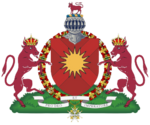Slaves Act (Makko Oko)
| Slaves Actt | |
|---|---|
 | |
| Citation | 2022 c. XX |
| Enacted by | Emperor Conall Solis |
| Date enacted | September 25th, 2022 |
| Date effective | September 25th, 2022 |
| Status: Struck down | |
The Slaves Act (c. XX) was an Act of the Monarch of Makko Oko which was decreed on September 25th, 2022 and came into force the same day. The act was the first law since the legalization of slavery to restrict it. Prior to the act, slavery was fully unregulated and no government office or agency could regulate it as such. This law gave the government the authority to regulate it, and in that, severely tempered down the level of slavery that could be enjoyed, prohibiting the selling and buying of people (the slave trade) and any and all forms of indentured servitude except for imprisonment, debt or for a specific statutory exception. It was made ineffective by the Supreme Court case Vanita Marissen v. Ministry of Diplomatic Affairs et al..
Legislative History
Cases
Sections
Section I - Definition of Slaves
Section II - Office of Slaves Affairs
Section III - Forced Slavery Proclamations
Section IV - Slavery & Citizenship
Section V - Slaves Rights
Enforcement
Effects
Full Text
SECTION I - DEFINITION OF SLAVES
ARTICLE I - A slave shall be hereto defined as any individual that has chosen to repay debts via slavery, currently incarcerated individuals, among other categories that may not be listed here.
ARTICLE II - Nobody may be forced into slavery unless such a force is legal under the laws.
ARTICLE III - The government may, as deemed fit, force any individual to become a slave, in exception to Article II.
SECTION II - OFFICE OF SLAVES AFFAIRS
ARTICLE IV - This legislation shall officially establish the Office Of Slaves Affairs within the Ministry Of Diplomatic Affairs with the exclusive authority and jurisdiction over anything relating to slavery and its laws and regulations.
ARTICLE V - The Office Of Slaves Affairs shall establish processes regarding the pardoning and freeing of slaves.
ARTICLE VI - The Office Of Slaves Affairs shall have the designated authority to regulate the slaves trade and slavery as a whole within the nation.
ARTICLE VII - No slave shall be infringed in their right to contact and speak to, the Office Of Slaves Affairs.
SECTION III - FORCED SLAVERY PROCLAMATIONS
ARTICLE VIII - Any individual who comes into the nation and is stateless, shall be officially designated, and become, a slave, or property, to the state, until such a time that they have earned the right to citizenship.
ARTICLE IX - Any individual that is currently incarcerated within the state's prison system may be forced to become a slave, but under this here article, is not mandated.
ARTICLE X - An individual that has accrued debt of 105,000 SLO's or more may be forced to become a slave in order to pay back the debt. Any less of a debt amount and slavery may not be forced, however, the individual may at any time voluntarily become a slave.
ARTICLE XI - Under a national emergency, martial law or a general mobilization, the government may force individuals to become slaves until the period of the event has concluded.
ARTICLE XII - Any individual that comes into the nation illegally and holds foreign citizenship, may be forced to become a slave, or property, to the state, for any duration or length of time as seen fit.
ARTICLE XIII - Unless there is valid suitable reason and an order by the Office Of Slaves Affairs has been issued, let it be declared under this article that no individual, citizen or not, may voluntarily become a slave.
SECTION IV - SLAVERY & CITIZENSHIP
ARTICLE XIV - Excluding stateless individuals, illegal immigrants, among other non-citizen classifications, a slave is still to be considered a citizen of the state, unless citizenship is revoked.
ARTICLE XV - If a slave is to obtain citizenship, such as for stateless individuals, they are to be mandated to take and get a passing score on the language and allegiance tests, with slaves being exempted from the state history test.
ARTICLE XVI - If a slave already holds citizenship in another nation, such as for illegal immigrants, they are not to be granted citizenship unless they agree to give it up, then they are to be a freed slave.
SECTION V - SLAVES RIGHTS
ARTICLE XVII - Slaves are to enjoy and are entitled to, every protection that non-slaves within the nation receive, where clearly defined.
ARTICLE XVIII - Slaves may not, and are not entitled to, a wage of any kind, including but not limited to, universal basic income, minimum wage or welfare or government assistance.
ARTICLE XIX - Slaves may not be terminated from any job they are to work, and only slaves, may terminate their job, so in that, they may move to a different job.
ARTICLE XX - Slaves have the right to free housing by their boss of who employs them, unless it is to cause an undue hardship, then government housing will be provided on the charge to the employer.
